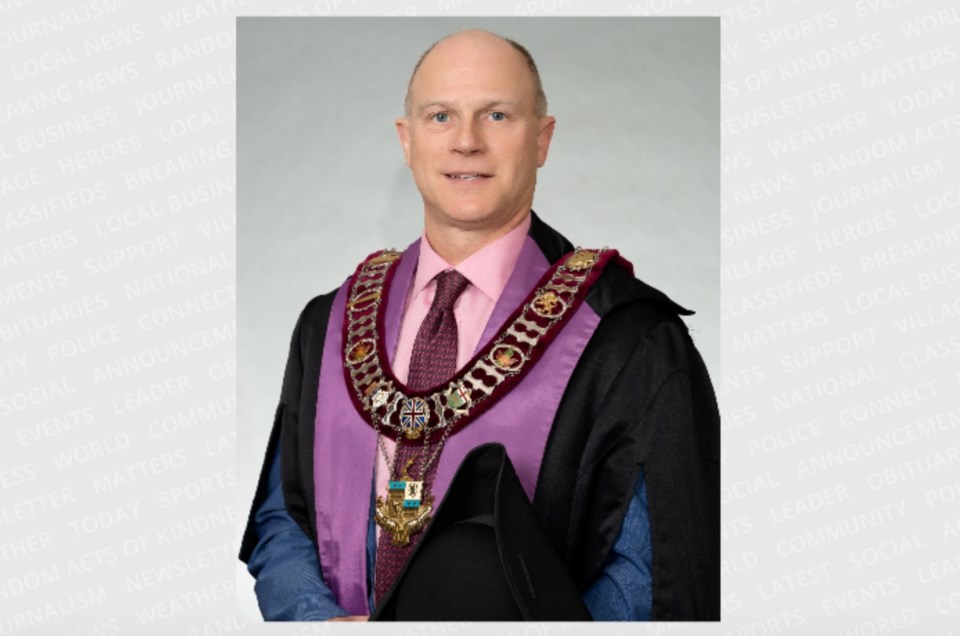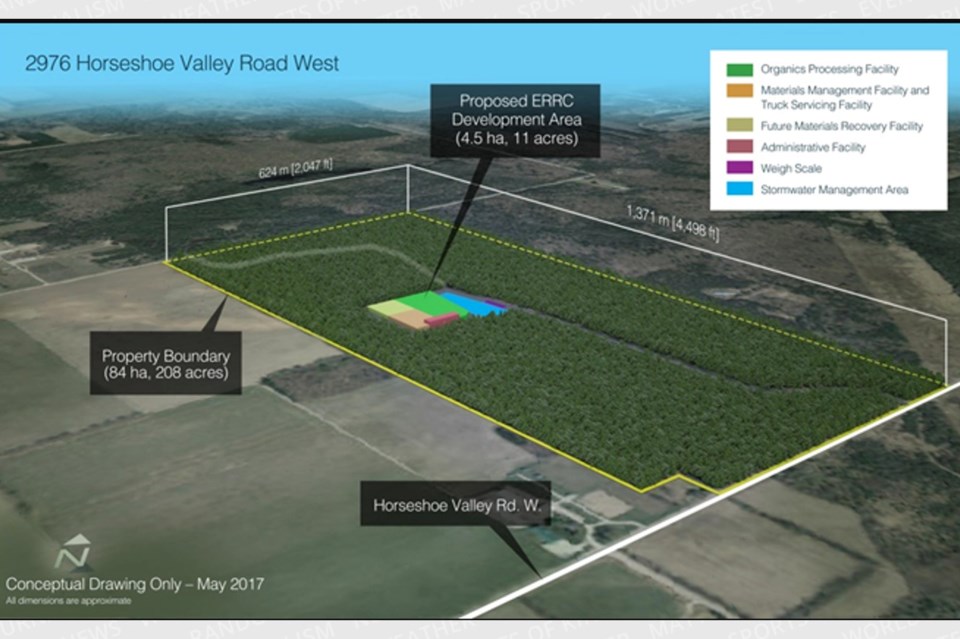A proposed organics and recycling processing facility that has been in the planning stages for more than 20 years is officially going out with the trash.
In a unanimous vote Tuesday, Simcoe County council decided to discontinue the development of the environmental resource recovery centre (ERRC), which was slated to be built at 2976 Horseshoe Valley Rd. W., in Springwater Township. Instead, the county will move ahead with awarding both a three-year, short-term and a 20-year, long-term organics processing contract.
The decision came following a staff report presented to council during Tuesday’s committee of the whole meeting.
In 2012, an initial report determined the ERRC was a viable project for both the processing of organics (OPF) and the transfer of recycling and garbage. The OPF’s required capacity was determined as 30,000 tonnes per year, and it was estimated that an anaerobic digestion facility would cost $35 million in capital funding.
Staff also suggested money in reserves related to the ERRC be transitioned in the waste management contingency reserve to fund required capital projects.
Staff began revisiting the plan after noticing industry trends, including the cost of other facilities being built, were significantly higher in cost given inflation driving up the costs of construction and required technologies.
Another factor was the provincial government’s announced plan to make producers of recyclable products fully responsible for the costs associated with the life cycle of those products, including collection, hauling, processing and marketing.
“In 2010, we embarked on what is now known as the ERRC. It would have essentially had two major components: a transfer station for garbage and recycling and an organics processing facility,” Rob McCullough, the county’s director of solid waste management, explained during his presentation to council.
Initial review and approvals to pursue the proposed ERRC project, which would have included an organics processing area, a materials transfer area, vehicle servicing area and a public education space to support waste diversion and awareness, began in 2010 and underwent an extensive site-selection process, consultation, study, appeal and approval process before zoning approval took place in 2022.
A lot of the work toward bringing the facility to fruition began in 2014 and resulted in site selection in 2016, noted McCullough. With the increase in construction costs and removal of being a county responsibility, the scope of the project has had to change.

“We lead the way in organics. We are No. 2 in the province. Simcoe County has always been proactive when it comes to dealing with garbage," Warden Basil Clarke told BarrieToday following Tuesday’s meeting.
"When you’re leading the way, the cost of being ahead of the market is why we looked at building our own facility so that we could continue to increase our organics," he added.
That said, a lot has changed since the site for the proposed ERRC was selected eight years ago, Clarke noted.
“After COVID, the market has drastically changed. The costs (have increased) and now there are other, larger players in the game," he said. "I really commend the staff, because we are at a shovels-ready process, but before putting shovels in the ground, (we) took another look at the market … and found a savings of $220 million. That’s the success story today.”
McCullough acknowledged that although significant investments have been made to date, to get to the point where they were able to do proper cost comparisons, that still required a lot of consultant work.
“The investment of what we’ve already made is about one per cent of the cost savings we are going to realize,” he said. “We are always looking in other areas, and we’ve seen some other big municipalities try to do organics processing, (but) the costs were coming in far higher.
"We tried to make corrections on that to try to assume more of the risk ourselves," McCullough added.
It was this past fall when staff began to notice “real warning signs” the proposed facility would not be as cost effective for the county as they’d intended, he said.
“We spoke briefly to council and decided to do a request for proposals to determine if that ‘business-as-usual’ cost of exporting was what we were imaging. We were happily surprised that it came back significantly cheaper than what we are doing right now,” McCullough said.
These changes, which include the cost of transporting organics to an external processor, will cost the county $157 million over the next 20 years.
“(That) is $220 million cheaper than the average development cost to do this ourselves,” said McCullough. “We are quite disappointed that we wouldn’t be able to do it as cost effectively ourselves, but we don’t want to be stuck in some cost fallacy where we have invested money.
"We need to come back to you and tell you that we understand where the market is and provide an option for the export we believe over the long term will be most cost effective," he added.
McCullough also noted if council approved moving forward with the contractor, staff have secured the tonnage would anticipate seeing given projected growth of the region as well.
That "secured tonnage" would also be more than capable of covering the county's needs as it anticipates an increased capture rate through different programs the county is likely to bring forward in the future, he added, as well as any potential changes the province may have.
Bradford West Gwillimbury Mayor James Leduc spoke in support of the recommendation during today's meeting.
“It’s good savings for us and shows we can do this for the next 20 years at a savings residents can take advantage of,” he said. “It doesn’t solve our waste issue, but it does help us with organics moving forward and allows us to concentrate on, down the road, building a facility that works for Simcoe County.
"Incineration is where I would go with my process, and I think this gives us a long time to investigate," Leduc added.
Clarke commended staff and council for their willingness to look at the market prior to shovels going in the ground.
“So many times, especially in government, you see when you start down a certain direction, and no matter what barricades are in the way, you keep plowing forward regardless of the cost," the warden said. "We don’t do that here. We always have the taxpayers in mind and poke our heads up and take another look before we plunge into something … and that’s when we found the savings."
The future use and zoning of the Horseshoe Valley Road property have yet to be decided.
“We don’t want to make any rash decisions," McCullough told BarrieToday. "I think within the next year or so staff will bring back a report to council to seek direction … on how to move forward. Whether we keep it for potential future uses … or whether the zoning is forgiven and goes back … that’s a future decision to be made."
Until that time, he said the property will remain part of the county’s public forestry program.
Council still needs to ratify this decision at its next meeting, which is scheduled for March 12.

